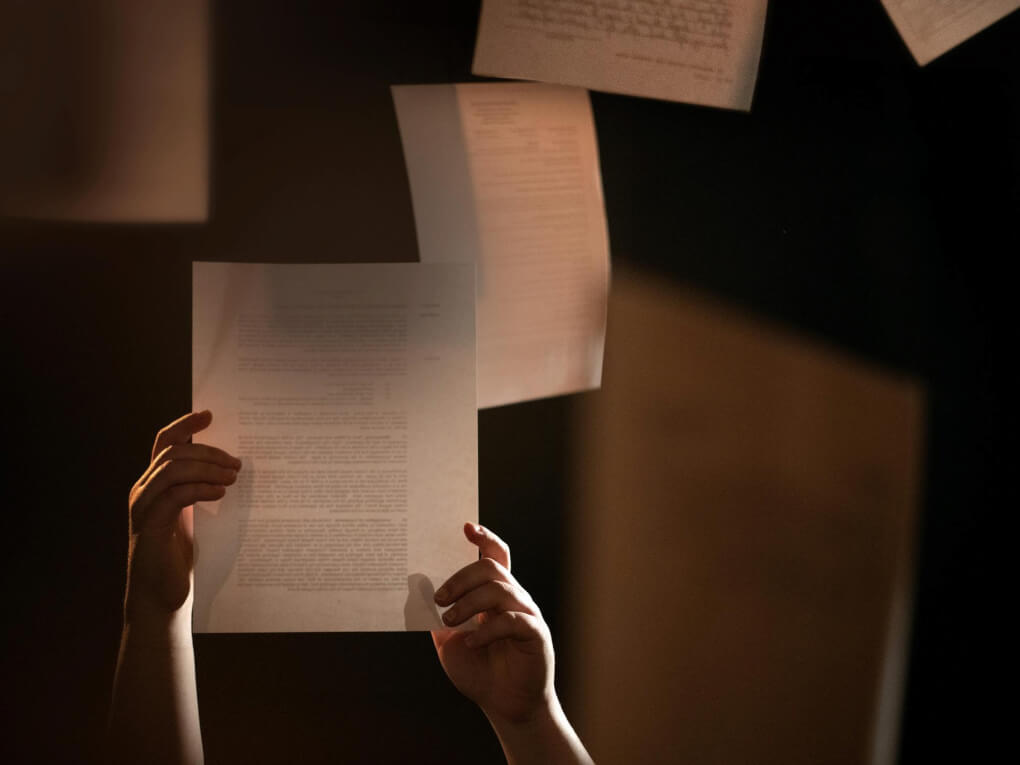Eight students sit huddled around a table in a second floor conference room of the DeVos Center on the Pew Grand Rapids Campus, pouring over their meticulous notes, ready to debate ideas.
On the surface, it may sound like a typical class of students at Grand Valley, dissecting their course material and discussing topics with their professors. But in this case, it isn’t exaggerating to suggest the students are dealing with a subject that carries sweeping repercussions.
Welcome to CJ 380, the Cold Case Investigations class.

Courtney Moelker works in a small room in the DeVos Center on the Pew Grand Rapids Campus to digitize documents, which will help the Michigan State Police develop leads for unsolved cases.

From left are students Elisa Guerrero and Nicole Smith. There are among eight students in CJ 380, 28 students had applied for the cold case class.
Under the guidance of Grand Valley criminal justice faculty Carrie Buist and Billy Wallace, students are helping the Michigan State Police develop leads and analyze patterns on a case that has remained unsolved for years.
There are more than 200 cold cases unsolved in Michigan, Wallace said. The class is the starting point for students to see the process law enforcement agencies and officers implement in their investigations. “You talk about experiential learning,” Wallace said. “This is the gold cup.”
The idea for the class has been simmering in Buist’s mind for years, but delays kept it from becoming a reality. When the Michigan State Police approached her with the same idea, she knew it was the opportune time. As Buist developed the class, she checked with colleagues at other universities who established similar classes.
“I knew the class was going to be good, but not this good,” Buist said. “I’ve been blown away by the students’ focus and enthusiasm.”
Students have responded wholeheartedly to the class. Colleagues suggested that she limit the class size to eight students — 28 had applied.
“It is a wonderful experience for someone my age to have and to feel like we are helping something bigger than us,” said senior Nicole Smith, who is majoring in psychology and minoring in criminal justice.
Smith said she initially approached Buist to discuss an idea for an independent study class.
“She said at the end of the call, ‘Have I told you about our cold case investigations class yet?’” Smith said. “And I said, ‘Your what?’”
With just a few hours until the deadline for applications, Smith rushed downtown to Buist’s office in the DeVos Center and slid the application under her office door. The class has exceeded her expectations, she said.

Christina Owens is pictured in a cold case class offered by criminal justice faculty members.
“When you dump a puzzle on a table when you are about to start, the first part is flipping all the pieces over. That’s our job,” Smith said.
“We’re not working on the border, we’re not putting any pieces together. We are simply just flipping over the pieces so the picture is showing. We see what parts of the picture look like, but we don’t actively put them together.”
The magnitude, gravity and complexity of their work is evident before they reach the classroom.
All personal belongings — laptops, bags, phones — are locked in a separate room. Classwork is performed on computers that only have access to secure servers provided by GVSU. The room’s whiteboards are thoroughly scrubbed and cleaned to eliminate any trace of writing.
Michigan State Police Detective Sergeant Cory Zimmerman, who works in liaison, said he’s been very impressed by the students selected and their approach to the classwork.
“The energy in that room is contagious,” said Zimmerman, a 12-year law enforcement veteran. “They are vested 100 percent into this. They are engaged. Their questions were excellent because they’ve done their homework. It’s refreshing.”
As serious as the course is, Zimmerman said it takes a particular set of skills to handle the enormous amount of information.
“It’s about being detail-oriented, organized, forward thinking,” he said. “You have to be open to different perspectives and other people’s thought processes.”
Smith and her seven classmates have forged bonds over the class, she said.
“The class has been one of the most unique, intense and special experiences of my life,” said Smith. “It is something I never thought I’d be able to do, and it really is just an incredible opportunity that I don’t think a lot of people get to do.”
BEHIND THE LENS


Staff members and a student from University Communications and Institutional Marketing hang 'evidence' on strings from the ceiling in a photo studio. Special lighting was added to create the top photo.







